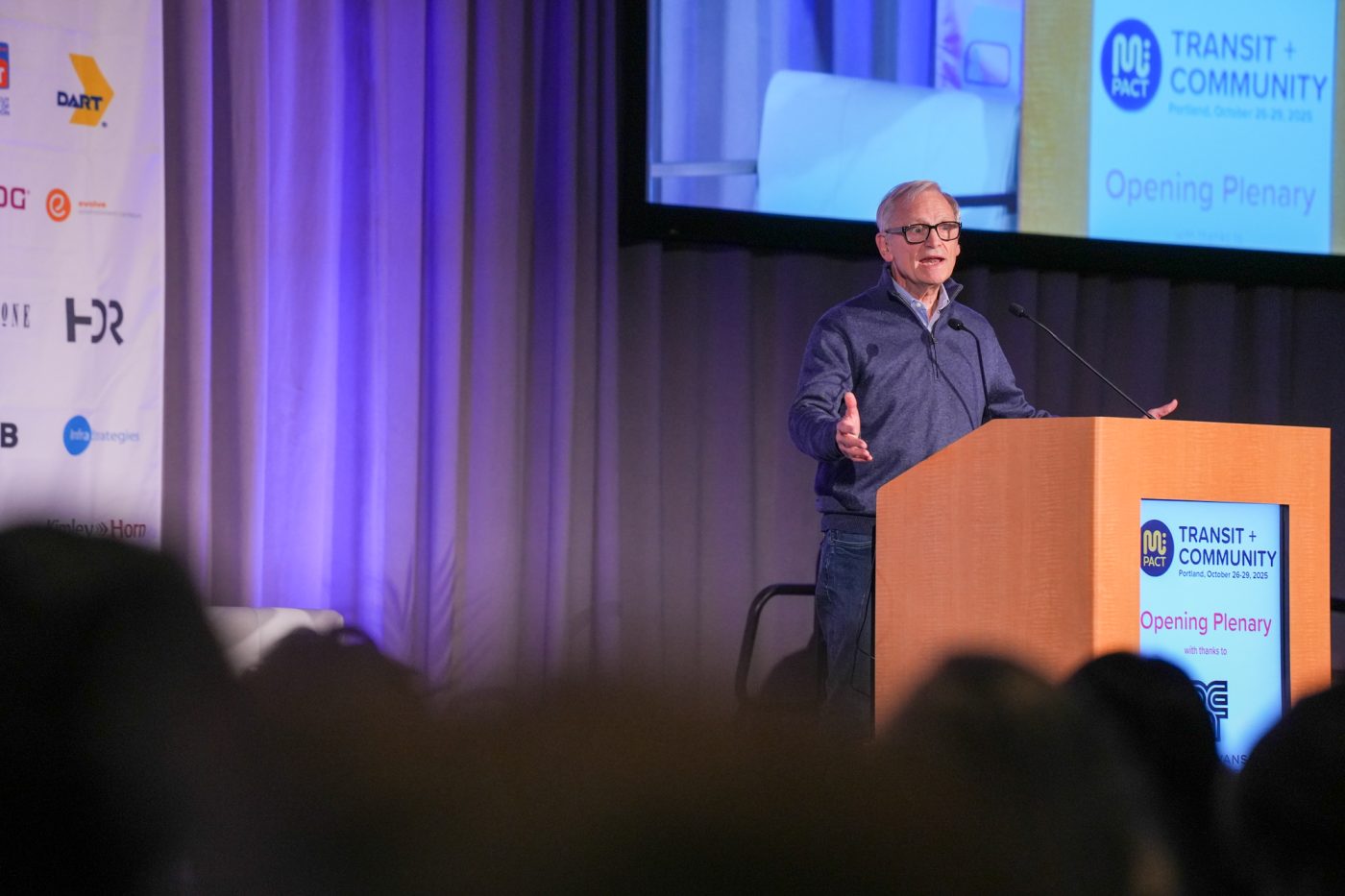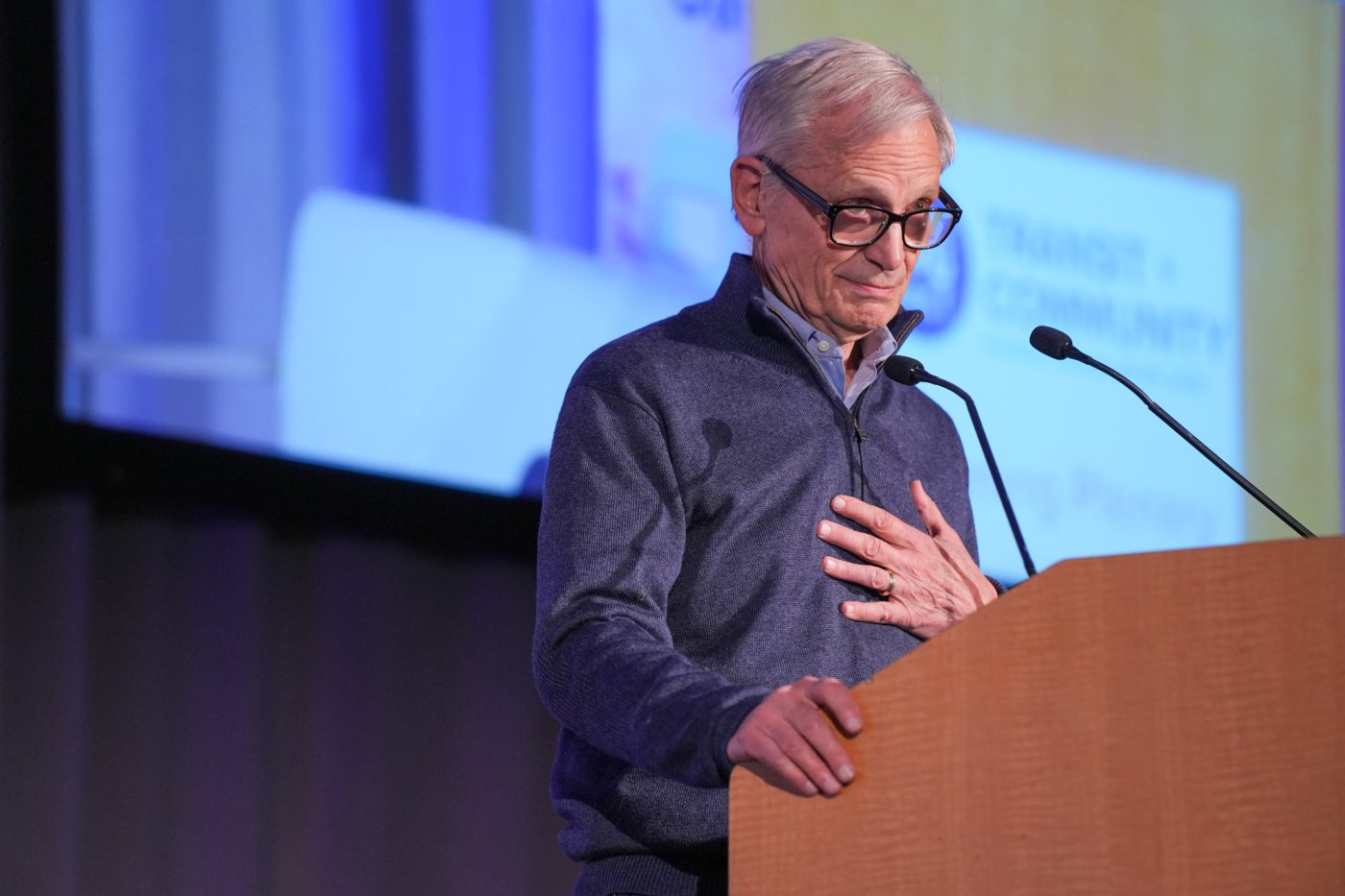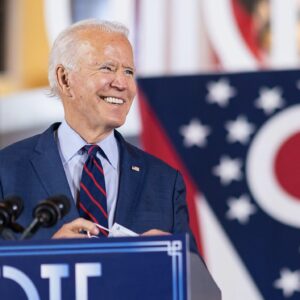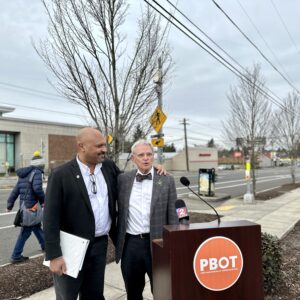This morning, for the first time in over 50 years, former U.S. Congressman Earl Blumenauer had an opportunity to give a speech unencumbered by the responsibilities of an elected official. Facing a large crowd in the Grand Ballroom of the downtown Portland Hilton Hotel on opening morning of a conference he founded 30 years ago, Blumenauer urged the assembled transportation professionals to go it alone.
“The federal government in this administration will do the right thing only by accident,” Blumenauer said. “And you can’t count on them.” “We control the land use. We price the curb. We can establish a policy framework that skips over the federal government,” he added.
Blumenauer spoke at the opening plenary of the MPACT Conference, which started in Portland in 1996 when it was called Rail-Volution. Back then, Blumenauer was a rookie in Congress and had just finished a 10-year stint as a Portland city commissioner where built his brand as a transit-oriented leader of a livable cities movement he would go on to export nationwide.
During one moment in his remarks this morning, Blumenauer appeared to become emotional when speaking about Portland’s recent challenges.
“We’ve had some tough times in Portland to be sure,” he said. “There are a few blocks you can see in the downtown that are challenging.” Then, as he said the next line, he gained strength and seemed to tear up at the same time: “But you can take a 10 minute walk in any direction and find some of the most livable neighborhoods anywhere in America!” he said, defiantly. “People here are committed to those goals and those values.”
Blumenauer likened the Trump administration to previous White House denizens who failed to see the writing on the wall. He told the story of how Portland led the renaissance in streetcars before there was any federal funding to make it happen. “We figured out a way to do it… and today we have 23 streetcar systems around the country,” he said, to loud applause. He urged his former colleagues in the crowd to focus on what they can control and to, “Not get all caught up in what the federal government takes away, or hoops they force you to jump through.”


While local and regional insiders are already laying the groundwork for a new transportation funding initiative, Blumenauer gave them even more motivation to plan the future without an expectation of federal support. He shared the example of public media and how the Trump administration has cut its funding. “We have seen every single dollar [of public broadcasting] cuts replaced by private donations, and then some,” he said. “This is what we can do when we’re committed, when we work together, and we are willing to make those investments.”
Blumenauer also brought up New York City’s successful congestion pricing policy as an example of something that, despite the federal government’s attempts to, “destroy it” and the difficult politics it took to make it happen, “It works as designed: Congestion is reduced. Air pollution is down, and there’s more money for transit.”
Politically, Blumenauer seems to think that the transportation funding pullbacks (he mentioned the $488 million Portland won for the Albina Vision Trust and Broadway Main Street projects specifically) by Trump and his transportation secretary will come back to haunt them come election time.
“Our challenge is to make sure our voices are loud and that we are heard,” he said at the end of his remarks. “Not just in elections, but in the transformational work you are doing around the country.”







Thanks for reading.
BikePortland has served this community with independent community journalism since 2005. We rely on subscriptions from readers like you to survive. Your financial support is vital in keeping this valuable resource alive and well.
Please subscribe today to strengthen and expand our work.
While it’s easy to criticize the current administration at a transportation conference in deep blue Portland and get raucous applause, the reality is the dysfunction in federal transportation funding goes all the way back to 1993. That year happens to be the last time the federal gas tax was increased to 18.4 cents per gallon and has remained at that rate for the past 32 YEARS! That’s a lot of presidential administrations and Congresses under BOTH Democrat and Republican leadership with no action on federal transportation funding.
Nice try. Trump took back $488 million from a very good project just out of spite. Save me w your defense of him.
C’mon Jonathan. The point I made is not to make a full throated defense of the current administration. It’s to point out that when it comes to federal transportation funding, the people we’ve elected to Congress or the White House have failed us for the past 32 years. To blame all our federal transportation funding problems on the current administration is revisionist history at best and simply feeds political spin to a receptive audience.
So JM, how do YOU explain the lack of federal gas tax increase since 1993?
lack of political leadership.
Maus has his blinders on as usual.
Car brain.
Do you mean the $488 million to buy off the community in order to make widening I-5 through the Rose Quarter politically palatable? That very good project?
Trump’s spitefulness did us a great favor, in my opinion, saving us from ourselves, at least for a while. If only Oregon Democrats would follow suit.
Jonathan,
I agree with you that we cannot “both sides” Trump when the destruction he is bringing dwarfs the neglect of previous administrations. And I think the Biden administration was investing in alternative energy and infrastructure, but Trump has undercut that significantly. Fuzzy has a point that previous administrations have neglected infrastructure, but none have been as damaging as Trump. Finally, I think you are referring to the Rose Quarter project when you reference the $488 Million- I am not sure if that counts a s “very good project” .
Jonathan, Fuzzy Blue was blaming everyone since 1993, not defending Trump. Maybe your “MAGA is everywhere” glasses might need a quick wipe. ♂️
Apparently Multnomah County has over 70,000 Trump voters, over 17% of those who cast ballots in 2024, presumably all living in Gresham, Troutdale, and unincorporated parts of the county…
I agree that Fuzzy was making a larger point about our collective lack of will, not exonerating the MAGAts for their truly destructive ideas about transportation.
Look at the inability of Oregon Democrats to make progressive ideas happen. Do we have freeway tolling with congestion pricing? Nope. Do we have fast and affordable transit? Nope – our transit is actually worse than it was 100 years ago, when several commuter rail lines ran into downtown. And look at the recent transpo-funding fiasco in the legislature, when Dems couldn’t pass their own bill.
Also any progressive must admit that the $488M for RQ freeway caps was all to enable the most un-progressive freeway-widening project. It was lipstick on a pig. Think of how that money could have helped transit, cycling, or walking – though it will never be used for those priorities in the current MAGA administration.
I mean if we’re serious about criticizing Federal transportation policy, the lack of gas tax raises since 1993 doesn’t even register. How about the systematic undermining of public transit since just about forever? Or the absolute shame that is US passenger rail policy? The gas tax should probably be higher but if that’s your biggest gripe, I dunno maybe try riding a bus on a transit system that cannot receive federal funds for operating (any transit system in a large city) and consider how transformative even a 25% federal match in operations would be. Then consider that the national highway system has gotten between 50% and 90% federal matching since the 1950s. It’s no wonder our transit is anemic, and it’ll take way more than indexing the gas tax to inflation to change that
Stole the words from my mouth blumdrew. COTW.
There’s a hard line to draw which is the most destructive Federal transportation policy, but I’d put a lot of my money on the past and current urban interstate highway system. There is some debate whether Eisenhower really wanted to raze large portions of US cities, but the practice continues today largely unquestioned, despite most other developed countries actively removing urban highways.
I agree that the wanton destruction of cities in the US is high up on the list of destructive federal policy, but I think to a large extent, it’s the long term land use implications of the freeways that have been most pernicious. It’s hard to overstate just how much land was developed into suburbs as a result of the interstate highway act, and these suburbs provided (and continue to provide) extremely difficult challenges to sustainable urbanism in the US. Of course, the “pull” that the post war suburbs had isn’t possible to talk about without the “push” of destroying inner cities in favor of shitty urban renewal and pavement.
How much of twentieth century urban policy in the US was willfully destructive is a question with no clear answer though. I think it was willful, and that the Eisenhower administration probably knew and intended to have superhighways within urban areas as part of the interstate highway act. Things like the Lower Manhattan Expressway probably less so, but roads like I5 in Portland are (in my opinion) a logical result of the highway building rhetoric of the 1950s that preceded the Interstate Highway Act.
It’s “Democratic” and Republican leadership. Just because George W. Bush was inarticulate, doesn’t mean everyone else has to copy him. It’s the “Democratic” Party, not the “Democrat” Party. Geesh.
“Politically, Blumenauer seems to think that the transportation funding pullbacks (he mentioned the $488 million Portland won for the Albina Vision Trust and Broadway Main Street projects specifically) by Trump and his transportation secretary will come back to haunt them come election time..”
Really? How so? Essentially no one in Portland (including me) voted for Trump. Not sure how cutting these Portland programs will negatively impact the Orange Guy at the ballot box…
The presidential election isn’t the only election, just saying.
Indeed — we’ve elected some pretty piss poor leadership at the state, county, and local level as well. And, unlike Trump, Portlanders are mostly to blame for those bad decisions.
It’s MPACT, and planners and advocates from elsewhere were surely much of the audience. He wasn’t just talking to locals.
You are correct. There’s only about 10 “swing states” that it matters in, and none of them are actually on the West Coast – no Republican entertains even the possibility of winning in Oregon, Washington, California, nor Hawaii (but they usually win tiny Alaska). Nevada, Arizona, and Colorado are the only western states that both parties are concerned about; the rest are in the Midwest, South, or East Coast, for both the presidential and senate elections. In the House, there are about 3 dozen seats that have any possibility of swinging, a majority of them on the East Coast – in general, incumbents ALWAYS win.
Why Portland’s roads are so bad: City Council ignores spending targets, funds other priorities. 2015 Oregonian article with Blumenauer one for the blame.
An aspiring transpo journalist might like to research why certain streets and roads in Portland are prioritized for repaving, while others are left to crumble and rot.
SW Garden Home Road fits into the latter category, along with many other roads and streets in Southwest – and probably most others in the rest of the city.
The other day I did my monthly hill-climb to Council Crest and was surprised to see that SW Talbot Rd – the portion just north of SW Talbot Terrace that connects SW Fairmount back to itself – has been repaved. It’s wonderful to bike on, but go just a few hundred yards west and you hit that awful section of eroded pavement east of Patton, where you are lucky not to wipe out. Why is that section allowed to crumble while a few feet away a much better section was repaved?
There seems to be no logic and no plan for how Portland’s streets are maintained. I wish someone could explain to us how it all works.
from that 2015 article that Brad Schmidt wrote:
The City Council has ignored its own spending guidelines for the past 27 years, redirecting nearly $200 million targeted for transportation projects to unrelated efforts, according to an analysis of city financial documents by The Oregonian/OregonLive.
(think of the pointless artwork that Portland city council has purchased in recent decades)
You mean like Portlandia where the City doesn’t even own the copyright to the statue us taxpayers paid for?? How dumb was that?
Fred, this used to perplex me as well. What I’ve come to understand is if a street’s pavement deteriorates beyond a certain point, it requires a full-depth rebuild (very expensive), but if you catch a street before it reaches this critical point of deterioration you can do a simpler (much cheaper) paving overlay. That may explain the Talbot / Patton disparity. This is doubtless a simplified view of paving, but it helps make some sense of how the PBoT maintenance bureau orders their priorities within their constrained paving budget.
When I lived in SE, the main street that I lived near was paved 3 times in 10 years. One was for the sewer project but the other 2 times none of my neighbors or I could figure out. I then asked a PBOT employee and they said one of their execs used that street to commute to work and didn’t like it when he encountered potholes on his drive.
Meanwhile, roads that were just a few blocks away and travelled by more people didn’t get such TLC.
So yeah, sometimes it just doesn’t make sense to us taxpayers why PBOT does what it does.
Sounds about right to me. I wonder which PBOT exec lives on that stretch of Talbot?
Let’s have congestion pricing on Oregon’s interstate highways!
No? – not a good idea?